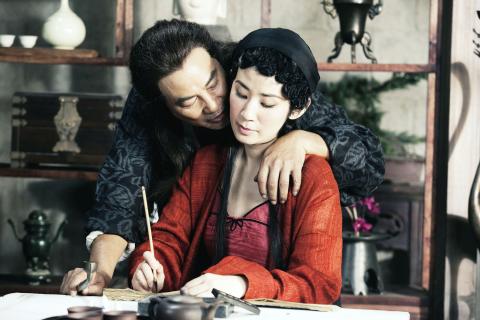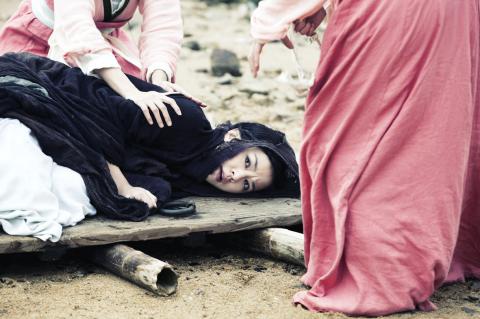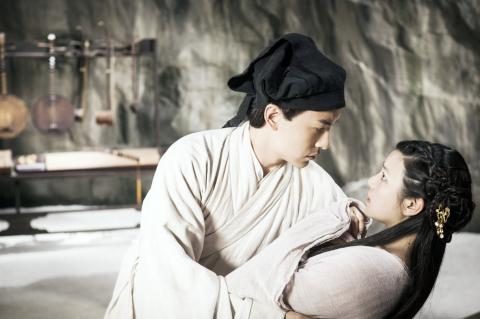In Ripples of Desire (花漾), lesbian filmmaker Zero Chou (周美玲) takes a break from her past acclaimed works on Taiwan’s homosexual community — Splendid Float (豔光四射歌舞團,2004), Spider Lilies (刺青,2007) and Drifting Flowers (漂浪青春,2008) — to tell a tale of heterosexual love and betrayal set on a fictional island during the Ming Dynasty. With a star-studded cast led by pop idols Jerry Yen (言承旭) and Michelle Chen (陳妍希), Chou’s first big-budgeted (NT$150 million) movie possesses both commercial appeal and cinematic ambition to create a period drama that is unequivocally Taiwanese.
Accompanied by the soulful nanguan (南管) music composed by iconic folk musician Chen Ming-chang (陳明章), the film opens with two young courtesans, Snow (Michelle Chen) and Frost (Ivy Chen, 陳意涵), performing in front of a large, excited crowd as residents come out to join the Ghost Month celebrations on the Floating Island. Though used as a penal colony by the Ming Empire, the southern isle nevertheless thrives on trade and has long become a haven for merchants, adventurers, pirates and other outcasts. Leading a gang of seafarers, charismatic Master Hai (Simon Yam, 任達華) places the place under his protection. Hai and his men earn respect by offering assistance to locals while defending the island against white colonists and the Ming imperial army.
At the center of the bustling activities is Floral Ripples, a brothel run by madam Hua Yue (Sandra Ng, 吳君如), who takes in the two sisters, Snow and Frost, and train them to become the island’s top courtesans. Virtuous and kind-hearted, Snow quickly falls in love with her voice teacher Wen (Joseph Cheng, 鄭元暢). Frost, on the other hand, believes that to survive in this cruel world, she needs to learn the art of manipulation and conceal her feelings for Scarface (Yen), Hai’s right-hand man.

Photo Courtesy of South Island Film Inc
Amid jealousy, strife and passion, the two sisters have all the while struggled to hide the secret that one of them suffers from a stigmatized disease, which will ruin their lives if made known to the islanders.
Inspired by director Chou’s childhood memories of growing up in Keelung, a port city where seamen from all over the world came and sought comfort at the neon-lit red-light district, the film ingeniously weaves together a fable of Taiwan caught in between the Western powers and imperial China through an intriguing love story between those who choose to stay on the untamed island. In her handling of the period piece, Chou replaces realism and history with atmospheric settings and pop aesthetics akin to that of anime and video games.
The pop sensibility is enhanced by the cast featuring big-name, young Taiwanese stars, though the emotional depth required by the characters is sacrificed to make way for the attraction of pretty-faced idols. The uneven narrative construction of the director’s previous works is still present, with melodramatic cliches sometimes interrupting the otherwise smooth narrative flow.

Photo Courtesy of South Island Film Inc
Billed as the first costume-drama movie made in Taiwan in 15 years, Ripples of Desire may have its share of flaws, but deserves attention and credit for its ambition to lift Taiwan’s filmmaking industry by working with local talent to create a genre piece that has not been done for more than a decade. It is also a successful example of how Taiwanese filmmakers can maintain strong local identity and their unique sensibilities when working for China-Taiwan collaborations aiming at the Chinese-speaking market.

Photo Courtesy of South Island Film Inc

That US assistance was a model for Taiwan’s spectacular development success was early recognized by policymakers and analysts. In a report to the US Congress for the fiscal year 1962, former President John F. Kennedy noted Taiwan’s “rapid economic growth,” was “producing a substantial net gain in living.” Kennedy had a stake in Taiwan’s achievements and the US’ official development assistance (ODA) in general: In September 1961, his entreaty to make the 1960s a “decade of development,” and an accompanying proposal for dedicated legislation to this end, had been formalized by congressional passage of the Foreign Assistance Act. Two

March 31 to April 6 On May 13, 1950, National Taiwan University Hospital otolaryngologist Su You-peng (蘇友鵬) was summoned to the director’s office. He thought someone had complained about him practicing the violin at night, but when he entered the room, he knew something was terribly wrong. He saw several burly men who appeared to be government secret agents, and three other resident doctors: internist Hsu Chiang (許強), dermatologist Hu Pao-chen (胡寶珍) and ophthalmologist Hu Hsin-lin (胡鑫麟). They were handcuffed, herded onto two jeeps and taken to the Secrecy Bureau (保密局) for questioning. Su was still in his doctor’s robes at

Last week the Democratic Progressive Party (DPP) said that the budget cuts voted for by the China-aligned parties in the legislature, are intended to force the DPP to hike electricity rates. The public would then blame it for the rate hike. It’s fairly clear that the first part of that is correct. Slashing the budget of state-run Taiwan Power Co (Taipower, 台電) is a move intended to cause discontent with the DPP when electricity rates go up. Taipower’s debt, NT$422.9 billion (US$12.78 billion), is one of the numerous permanent crises created by the nation’s construction-industrial state and the developmentalist mentality it

Experts say that the devastating earthquake in Myanmar on Friday was likely the strongest to hit the country in decades, with disaster modeling suggesting thousands could be dead. Automatic assessments from the US Geological Survey (USGS) said the shallow 7.7-magnitude quake northwest of the central Myanmar city of Sagaing triggered a red alert for shaking-related fatalities and economic losses. “High casualties and extensive damage are probable and the disaster is likely widespread,” it said, locating the epicentre near the central Myanmar city of Mandalay, home to more than a million people. Myanmar’s ruling junta said on Saturday morning that the number killed had